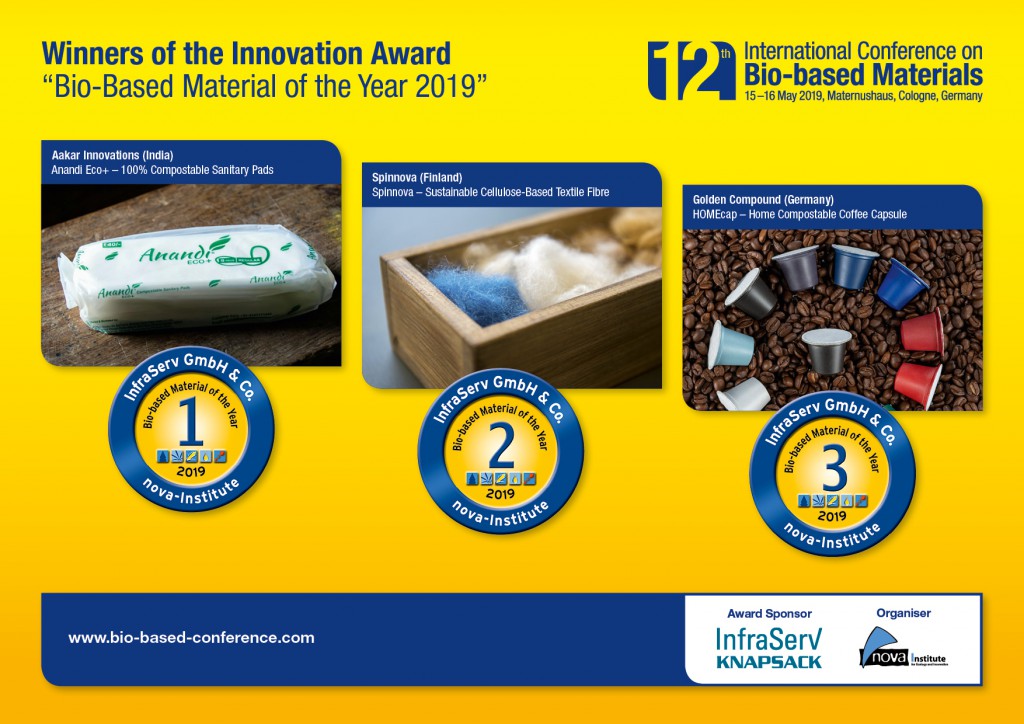After a 10-minute presentation from each of the six nominated companies, the three award winners were chosen by the expert audience at the “12th International Conference on Bio-based Materials” (www.bio-based-conference.com). The six nominees were previously selected by a jury from a total of 21 submissions. With more than 270 participants and 30 exhibitors, the conference was able to further establish itself as one of the world’s most important meeting places for the leaders of the bioeconomy.
Visuals, German version and PDF file available at http://nova-institute.eu/press/?id=120
InfraServ Knapsack sponsored the Innovation Award and presented it together with Michael Carus, Managing Director of nova-Institut GmbH and organizer of the conference.
Organizer Michael Carus, nova-Institute, was enthusiastic about the overwhelming response: “The most important pioneers of the global bioeconomy met in Cologne and exchanged views on the strong dynamics of the industry. Previous hopefuls of the bio-based chemistry are weakening and others are making amazing breakthroughs!”

The winners in detail:
First place: Aakar Innovations Pvt. Ltd. (IN): Anandi Eco+ – 100% Compostable Sanitary Pads
Anandi Eco+ is the first and only Govt. of India Lab certified 100% compostable sanitary pad. In a compost environment, at least 90% of the pad are biodegraded within 180 days. Under other conditions in nature it takes longer respectively. The pads can be disposed easily in the backyard mud pit of any rural household to avoid polluting the environment and create bio-manure for agriculture. Aakar also uses local resources like starch, jute, bagasse, banana fibre and water hyacinth to produce their sanitary pads to reduce cost and utilizes agricultural plant waste materials. Anandi Eco+ pads do not use any harmful chemicals like SAP and convert into manure post disposal, which can be further utilised. This way, the pads contribute to environmental protection and increased resource reuse. It also follows the Compostable American Standard ASTM D6400 & European Standard EN 13432. Aakar contributes to 12 out of the 17 Sustainable Development Goals of the UN through their work. Decentralised production is carried out by women in India and soon also in various African countries on the basis of regional raw materials. More information: www.aakarinnovations.com
Second place: Spinnova Oy (FI): Spinnova – Sustainable Textile Fibre
Spinnova is a sustainable fibre company from Finland that develops ecological breakthrough technology for manufacturing cellulose-based textile fibre. Spinnova’s patented technology does without harmful chemicals and creates no waste or side streams, making the fibre and the production method probably the most sustainable in the world. The biggest difference to other man-made cellulosic fibres is that no chemical dissolution takes place throughout the whole process. Spinnova’s raw material commitment is to only use FSC certified wood or waste stream-based cellulose. Spinnova’s objective is to globally commercialize the fibre products in collaboration with major textile brands. The properties and prices of the new cellulose fibres are based on cotton.
More information: www.spinnova.com
Third place: Golden Compound GmbH (DE): HOMEcap – Home Compostable Coffee Capsules
HOMEcap is the world’s first and only home compostable capsule successfully introduced in the market that is ‘OK compost HOME’ certified and made with natural fibres of the sunflower seed hull. The biodegradation in home compost avoids considerable waste streams. The capsule was successfully launched on the market in the spring of this year. It is made from a unique compound comprising PTTMCCs PBS and PBSA mixed with sunflower seed shells and inorganic fillers. It comes with a paper and cellulose based lid, which is sealable to the capsule without any additional glue, and of course the lid is home compostable as well. The material composition results low oxygen transmission rates, which allows to avoid additional barrier packaging and therefore saving waste. A VDI 4605 sustainability assessment showed that this capsule outperforms current state of the art capsules like deep-drawn PP EVOH multilayer capsules in terms of sustainability.
More information: www.golden-compound.com
The nova-Institute would like to acknowledge InfraServ GmbH & Co. Knapsack KG (DE) for sponsoring the renowned innovation award “Bio-based Material of the Year 2019”. UPM (DE) is supporting the conference as Gold Sponsor, Neste (CH/FI) as Silver Sponsor and FKUR (DE) as Bronze Sponsor. nova-Institute also thanks CLIB (DE) as Premium Partner for the close cooperation.
Source
nova-Institut GmbH, press release, 2019-05-16.
Supplier
Aakar Innovations
Cluster Industrielle Biotechnologie e.V. (CLIB2021)
FKuR Kunststoff GmbH
Golden Compound
InfraServ GmbH & Co. Knapsack KG
Neste Corporation
nova-Institut GmbH
Spinnova
UPM Corporation
Share
Renewable Carbon News – Daily Newsletter
Subscribe to our daily email newsletter – the world's leading newsletter on renewable materials and chemicals









